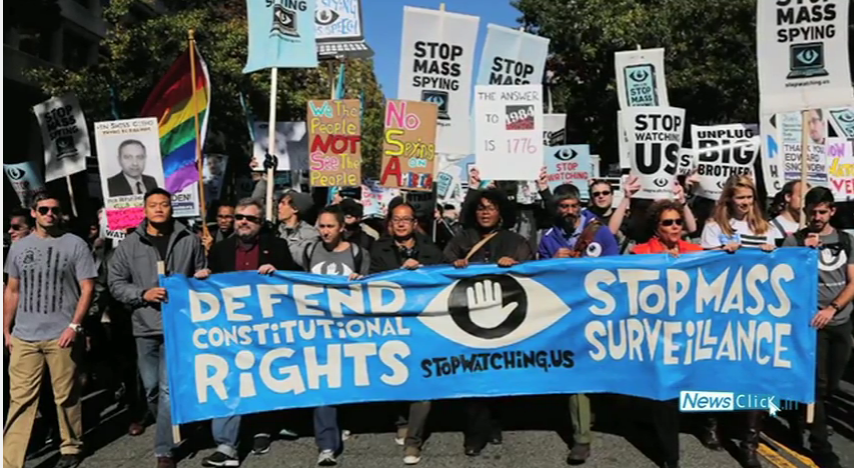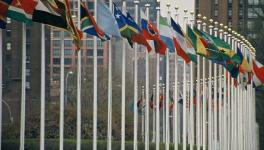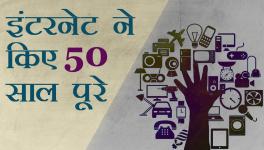Issues of Internet Governance
Richard Hill, Independent Telecommunications Consultant based in Geneva, talks to Newsclick on the issues of Internet governance. He says Internet is highly centralised from the point of view of the management of the addresses and names; far more so than other telecommunication technologies. Too much of wealth concentration is a major issue and there is a great need for re-distribution of profits. Issues of taxation have also come to the fore, he says. Hill argues that countries like India should speak out against mass surveillance, and ask for improving privacy protection.

Transcript:
Rishab Bailey (RB): Hello and welcome to Newsclick. As you're aware issues of Internet governance have been in the media for the last 6-8 months following the Snowden revelations. Joining us to discuss these very very important issues, we're very glad to have with us Richard Hill. Richard is an independent telecommunications consultant based out of Geneva. He was formally with the ITU and led their secretarial groups dealing with the new ITRs. He's also been part of the study groups dealing with issues such as numbering, charging and accounting, networks and performance and so on. Richard I'm just going to jump straight into the questions. Firstly, why do we need an international body to deal with telecommunications?
Richard Hill (RH): Well not everybody thinks we do but the fact is ever since the invention of telegraphy in 1865, there have been international agreements so as to facilitate international telecommunications and so as to make sure that everybody can communicate. So the purpose of those agreements was to agree to certain standards, to agree on how the financial flows are settled, to agree on issues such as privacy. Up to now we've always had such an agreement.
RB: So what role does the ITU itself play in this telecommunication space?
RH: The ITU is just a facilitator of dialogue between member states and also industry groups. So the purpose of ITU is to bring people together so they agree. They can agree treaties, they can agree non-binding resolutions, they can agree standards which are voluntary. The ITU has always done this and it has done this to everybody's satisfaction until these Internet issues came up. We'll now I think explore a little bit more. There's some dissentions about what is the proper role of the ITU and other UN bodies.
RB: Now given that the ITU appears to be the only legitimate international body dealing with telecommunication issues, why was there such a backlash in the western media particularly around the time of the world conference on information technology, regarding the ITU actually dealing with issues of the Internet?
RH: This is a matter of interpretation, I'll give you mine. I believe that it's because in the ITU it's relatively a level playing field. Not perfectly level, but it's still more levelled than the other playing fields where Internet policy matters are discussed which tend to be dominated by the US and their interest. So economic interests, particularly in the US but not exclusively, and Geo-political interests almost exclusively from the US, felt threatened by the discussions that were going on in the ITU, so they attempted to lock this out. This is nothing new. As you know from the Global South, there's a general trend of trying to lock discussions out of forums where the Global South is well represented or even in a majority and move them into other forums where the South is less well represented.
RB: Strategically, what do you think the Global South countries can do then to avoid such situations from arising again, for instance at the Brazil meeting, which is coming up in April this year?
RH: I think you actually just have to keep trying, you have to keep pushing the fact that the UN is the legitimate forum. One country one vote may not be the perfect system but surely it's more democratic than some people saying well we're democratic and you're not and we have a process which is better than your process. Maybe, but who is to decide that? We need to avoid capture of wrong issues. So one of the things that broke down in Dubai is, as I recall, the press had lines where 'China and Russia are conspiring to use the ITU to impose censorship'. Now anybody who knows anything would know this is a silly statement. We shouldn't allow this to go unchallenged in the press but it was largely unchallenged in the press and why did the say that? Because it's easier to sell- defend freedom of speech than it is to sell- defend my ability to make money because I have a dominant position or defend my ability to conduct surveillance on a unilateral basis all over the world without any constraints. Now neither of those two proposals is going anywhere so let's mask the issue. So I think there's an educational process and I'm glad that you're part of that educational process to try to bring the Global South up to understand that these are real issues and no, you don't have to swallow the western propaganda, you can stand up against it.
RB: Now this is an issue that you've broadly discovered just now but do you believe that the UN is actually a viable framework to deal with such issues? Given, firstly, that Internet has traditionally been standardized in a bottoms-up fashion, also given that the various systemic problems that the UN is accused of whether it's disproportionate influence of its Security Council members, whether its problems with transparency and participation and so on. So do you think its an appropriate forum?
RH: Yeah I don't think the UN itself should get involved. It would be the specialised agencies- WIPO, ITU, UNESCO and so on where some of these structural issues, that you mentioned, of the UN are less severe. It's true the UN is not perfect. No democracy is perfect. I believe it was Churchill that said- “this is a terrible system but it's the least worst system.” So we have to live with it. I think in the current configuration it's hard to see anything better. The standardization process used in the Internet is no more or less bottoms-up than any standardization process and I'm familiar with many of them. The ITU is actually just as bottoms-up as the IETF is. The membership composition is different, the IETF is more open, the ITU is less open. Those are differences but the process itself of standardization is always bottoms-up and it's always on a consensus basis. If people don't like the standard, they don't implement it. They go somewhere else and they get another one. On the other hand, what is not very often talked about, is the fact that the Internet is highly centralised from the point of view of the management of the addresses and names, far more so than the other telecommunication technologies. So this fact that somehow the Internet is this giant decentralised organ, as opposed to some giant centralised previous organ, is completely false. The level of centralisation for Internet is actually higher in some areas than it ever has been for previous technologies.
RB: Now my final question. Given that India has not yet acceded to the ITRs, what role do you think India can play in formulating a progressive vision of the Internet?
RH: I think these are two separate matters. Acceding to the ITRs, as I understand it, probably requires ratification, that is approval by the Indian Parliament and I will understand that that might be a complex process in a very vibrant democracy as you have in India. Independently of that formal process India could implicitly reverse its position and say- 'now in light of the Snowden revelations and all that, we understand actually there was nothing wrong with the ITRs'. I'm happy to explain why, from a legal point of view to anybody who would be interested in going to more depth on that. Okay, so we're not acceding because that's a complicated process but in spirit we are signatories to that. Then follow up on that and say- 'look this was unfinished business. We failed to reach an agreement, that's regrettable. We do have to make some changes because if we just try the same thing again we will not find agreement but let's continue the process. Then the question which you haven't asked but is where to continue the process? Brazil may or may not be an opportunity, the ITU plenipotentiary may or may not be an opportunity, so this requires some thinking and some revaluation but I think that India could, together with, Brazil and South Africa, which are the three clearly democratic BRICS, some people think Russia's democratic, I think China most people would not think it's democratic, but those three- South Africa, India and Brazil clearly are western democracies in terms of their political structure. They could ally and say we as the democracies feel certain things should be done, in particular stop this mass surveillance, improve privacy protection, recognise that there's too much concentration of wealth and we need to somehow redistribute these profits more evenly around the world, there's the taxation issue which is coming up where even the G20 has said there's a problem there. So I think that's something you could get into.
RB: Okay. That's all the time we have today. Thank you Richard for joining us and thank you for watching.
Get the latest reports & analysis with people's perspective on Protests, movements & deep analytical videos, discussions of the current affairs in your Telegram app. Subscribe to NewsClick's Telegram channel & get Real-Time updates on stories, as they get published on our website.
























